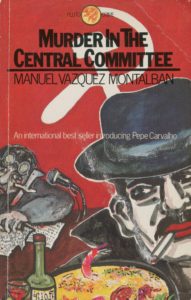Currently under
construction.
We're adding features,
and making the site
available on phones.
Bear with us...
A few things are working.
Try them out
Currently under
construction.
We're adding features,
and making the site
available on phones.
Bear with us...
A few things are working.
Try them out
Who was Dashiell Hammett? One-Hour Video Discussion of the Maltese Falcon

DukeReads: Michael Malone on Dashiell Hammett’s ‘The Maltese Falcon.’ Access Here
Dashiell Hammett: from Pinkerton spy to proletarian writer
RADICAL NOIR: 26 ACTIVIST CRIME NOVELS
 Revolutionaries, Agitators, and Organizers in Crime Fiction Some subject matters and historical settings naturally lend themselves to radical politics. Crime fiction has often had sympathy and respect for the down-and-out and oppressed. Suppose noir is when obsession and belief turn to action when inertia is disrupted. In that case, it should be no surprise that the actions of revolutionaries, organizers, and activists drive many a plot. Access Here
Revolutionaries, Agitators, and Organizers in Crime Fiction Some subject matters and historical settings naturally lend themselves to radical politics. Crime fiction has often had sympathy and respect for the down-and-out and oppressed. Suppose noir is when obsession and belief turn to action when inertia is disrupted. In that case, it should be no surprise that the actions of revolutionaries, organizers, and activists drive many a plot. Access Here

Eight Tragedies of Shakespeare: A Marxist Study
Book Study: In this companion volume to Shakespeare: Poet and Citizen Kiernan sets out to rescue Shakespearean studies from the increasingly solipsistic terrain of literary criticism, focusing instead on historical location to understand Shakespeare’s writing. (Karl Marx himself was a great fan of Shakespeare, as summarized HERE in an article). Access Here

The Lennie Moss Mysteries: Tales of a Modern Working-Class Hero Tim Sheard’s hero is a union shop steward as a modern Ms. Marple. The author provides realistic details of hospital routine and budget-cutting politics. Other bonuses are polished prose and elements of warmth and humor. Strongly recommended for most mystery collections. Access Here
The Adventure of English Eight 50-minute video episodes covering the birth of the English language as a hybrid to its globalization. Access Here
Maya Angelou on Life and Literature
50-minute interview in five parts. Armstrong Williams interviews writer and poet Maya Angelou. Maya Angelou is considered one of the greatest voices of contemporary literature. Angelou talks about what it was like growing up. You will be surprised at the shocking trials Maya Angelou had when she was younger. She gives great insight into how she became the Maya Angelou of the contemporary Renaissance. Access Here
THE HANDMAID’S TALE Author Margaret Atwood discusses her dystopian classic and being a consultant on the hit Hulu series based on it. Atwood reflects on using fiction and essays to warn about authoritarianism, climate change, and other dangers. HERE

KEROUAC READING FROM ON THE ROAD. And interviewed by Steve Allen in this rare video from the late 1950s. Kerouac wrote On the Road in three very short weeks in 1951. But then it took six years for the book, famously written on a long scroll, to reach the reading public in 1957. Shortly after its publication, critics were at least quick to recognize what the book meant. One New York Times reviewer called it “the most beautifully executed, the clearest and the most important utterance yet made by the generation Kerouac himself named years ago as beat.”
Nelson Algren Is a Writer for Our Times. The author’s stories feel more relevant today than perhaps ever before. Shaped by his days riding trains during the Great Depression, and who persisted in writing about the noir worlds of drug addicts, prostitutes, and thieves even during the more prosperous years of post-World War II America. he was “The bard of the stumblebum,” mocked critic Leslie Fielder. “The Last of the Proletarian Writers.” But he persists for a couple of reasons. First, writers love writing about Algren because Algren was a writer’s writer, never allowing money, love, status, or comfort to distract him from pursuing his art.
Allen Ginsberg reads “Howl,” (Big Table Chicago Reading, 1959)
Shakespeare for Today: War and Leadership in Henry V. Four PBS videos with a teaching and study guide for introducing the Bard to today’s youth.
50 Sci-Fi & Fantasy Works Every Socialist Should Read

Reposted from Fantastic Metropolis by author China Mieville: “This is not a list of the “best” fantasy or SF. There are huge numbers of superb works not on the list. Those below are chosen not just because of their quality—which though mostly good, is variable—but because the politics they embed (deliberately or not) are particularly interesting to socialists. Of course, other works—by the same or other writers—could have been chosen: disagreement and alternative suggestions are welcomed. I change my own mind hour to hour on this anyway…” ALSO: ‘Reds in Space‘, a listing of radical sci-fi in a North Star post.